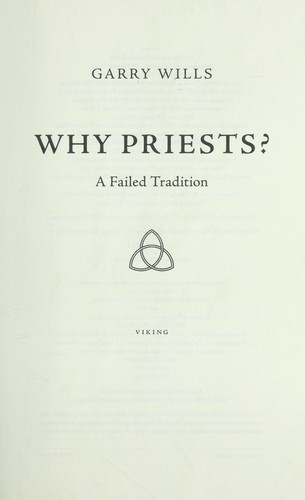302 pages
English language
Published June 9, 2013

302 pages
English language
Published June 9, 2013
In his most provocative book yet, Pulitzer Prize winner Garry Wills asks the radical question: Why do we need priests? Author Wills spent five years as a young man at a Jesuit seminary and nearly became a priest himself. But after a lifetime of study and reflection, he now poses some challenging questions: Why do we need priests at all? Why did the priesthood arise in a religion that began without it and opposed it? Would Christianity be stronger without the priesthood, as it was at its outset? Meticulously researched, persuasively argued, and certain to spark debate, Why Priests? asserts that the anonymous Letter to Hebrews, a late addition to the New Testament canon, helped inject the priesthood into a Christianity where it did not exist, along with such concomitants as belief in an apostolic succession, the real presence in the Eucharist, the sacrificial interpretation of the Mass, and the …
In his most provocative book yet, Pulitzer Prize winner Garry Wills asks the radical question: Why do we need priests? Author Wills spent five years as a young man at a Jesuit seminary and nearly became a priest himself. But after a lifetime of study and reflection, he now poses some challenging questions: Why do we need priests at all? Why did the priesthood arise in a religion that began without it and opposed it? Would Christianity be stronger without the priesthood, as it was at its outset? Meticulously researched, persuasively argued, and certain to spark debate, Why Priests? asserts that the anonymous Letter to Hebrews, a late addition to the New Testament canon, helped inject the priesthood into a Christianity where it did not exist, along with such concomitants as belief in an apostolic succession, the real presence in the Eucharist, the sacrificial interpretation of the Mass, and the ransom theory of redemption. But Wills does not expect the priesthood to fade entirely away. He just reminds us that Christianity did without it in the time of Peter and Paul with notable success.--From publisher description.